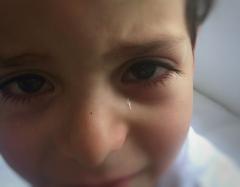Fitore Vitija, a 26-year-old mother, is expecting her second child this month. On her due date she was at the University Clinical Center of Kosovo and says that she was very concerned that night. What made her feel even worse were the words she heard and things she saw there.
She shared a room with a woman who couldn’t wait to give birth and leave that place because she said she was raped and was not going to take the child with her.
Another woman sent a request to do a DNA test on her child because her husband did not believe it was his. She was very angry and said that she was going to leave her baby in the hospital.
“I can’t understand how these mothers don’t show love to their children, how they decide to abandon them so easily. The woman, with whom I shared the room, hadn’t brought any clothes for her newborn, not even a towel to wrap the baby. She didn’t even want to hold the baby,” says Fitore.
According to the Kosovo Agency of Statistics, the average number of babies born in Kosovo per year has been 32,000 for the last eight years. Last year, however, there was a noticeable decrease to 23,494.
During these eight years, the average number of abandoned babies was 50 per year, according to the Kosovo Agency of Statistics.
The University Clinical Center of Kosovo claims that in the first half of this year, five children were abandoned.
Vlora Fazliu, a 31-year-old mother of two, says that she happily decided to get pregnant and bring a child to life. She says that she can’t even imagine abandoning her child.
“Children don’t decide to come to life, we as parents decide. It is our duty as parents to take care of them, no matter what the circumstances we are in, at least to be close to them, with what power we have.”
Vlora believes that there is no feeling better than bringing a human being to life and watching it grow every day. She had a lot of problems during her pregnancy but at the end she says the wait, the pain and the difficulties during the nine months were all worth it since her two children are the most precious gift she possesses.
“There are different reasons why people abandon their children, mostly because of social and economic reasons,” says Mevlude Veseli-Bajra, a social worker at the Gynecology Department in the University Clinical Center of Kosovo.
She believes that no mother willingly abandons her child. It only happens in very rare cases.
“A lot of women who abandon their child do it because of their difficult life circumstances, like if others won’t accept them, for example, the father of the woman won’t accept her child. Other times, ex-boyfriends don’t take responsibility for the child. In these cases some women lie to their families and tell them she has been raped, to justify their pregnancy. In case her family does not support her, she is forced to abandon the baby because of the lack of income. The lack of education and the mentality of the people push young women to abandon their babies as well,” says Veseli-Bajra.
According to the University Clinical Center of Kosovo , the number of abandoned children is decreasing: the number of abandoned children last year was 23, noticeably higher than this year.
The social worker Veseli-Bajra believes that having conversations with parents, mainly mothers who are thinking of abandoning their children, can help make them change their minds. She says that some women only need a little encouragement to keep their baby. Veseli says that the number of abandoned children would decrease further if the government would offer shelter and financial support for mothers.
The regulations and policy of the University Clinical Center of Kosovo state that abandoned newborn babies stay in the hospital for 21 to 28 days. Then the Center for Social Work of the municipality where the mother lives decides what happens to them. These social centers have foster families with whom they work.
Another place where they can find support, education and care for these children is “SOS Children’s Village.”
Besnik Peci alternative leader at SOS children’s village says that “alternative care” consists of “SOS Families” and “Youth Home.”
“Currently 13 babies are placed in the “short term infant care”, while 38 are other children are part of “SOS Families.” These SOS families are integrated in the community. We also have 11 children who are sheltered in the Youth Home who get personal development services. We are currently taking care of 62 children 24 hours a day,” says Peci.
Seven other children are partly independent. They have the support from SOS Children’s Village although they aren’t part of it. They live in the city but get material, educational and health support.
“Other than helping children who have no parental care, SOS Children’s Village also works on strengthening families and preventing abandonment. Currently over 600 children and over 400 families receive services from our social workers to prevent family distribution and child abandonment,” says Peci.
All children who cannot afford psychological sessions they can get them for free at the “SOS Village” advising center. The village offers psychological and pedagogical sessions, as well as sessions for children with speech problems.
Peci says that all the children who are admitted have been referred by the Center for Social Work of the respective town and from the State Department for Labor and Social welfare.
Children from “SOS Children’s Village” have been successful in life. Most of them are now independent adults who have graduated from university, are employed and now have their own children.
Nafie Sylejmani








